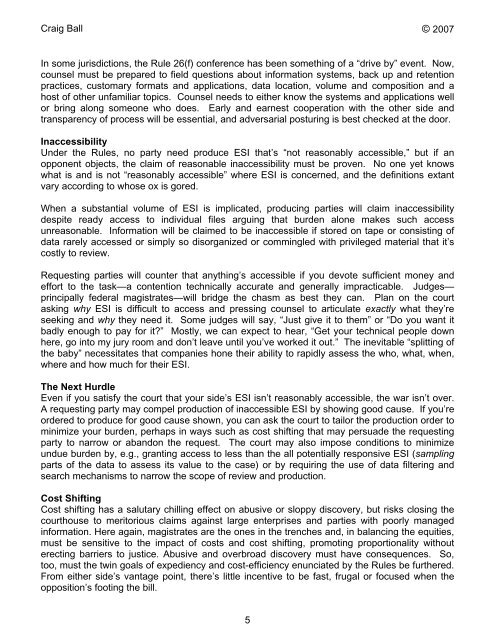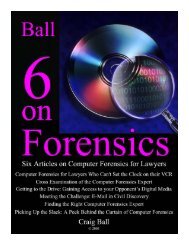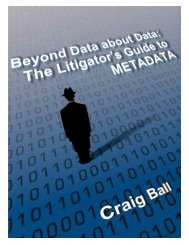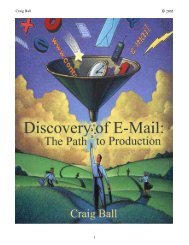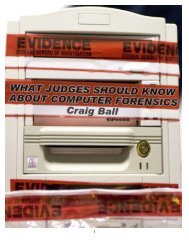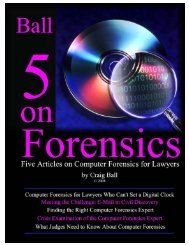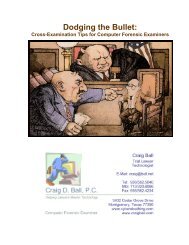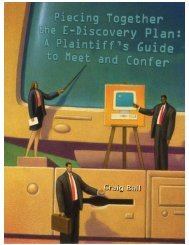Six Articles on Electronic - Craig Ball
Six Articles on Electronic - Craig Ball
Six Articles on Electronic - Craig Ball
Create successful ePaper yourself
Turn your PDF publications into a flip-book with our unique Google optimized e-Paper software.
<strong>Craig</strong> <strong>Ball</strong> © 2007<br />
In some jurisdicti<strong>on</strong>s, the Rule 26(f) c<strong>on</strong>ference has been something of a “drive by” event. Now,<br />
counsel must be prepared to field questi<strong>on</strong>s about informati<strong>on</strong> systems, back up and retenti<strong>on</strong><br />
practices, customary formats and applicati<strong>on</strong>s, data locati<strong>on</strong>, volume and compositi<strong>on</strong> and a<br />
host of other unfamiliar topics. Counsel needs to either know the systems and applicati<strong>on</strong>s well<br />
or bring al<strong>on</strong>g some<strong>on</strong>e who does. Early and earnest cooperati<strong>on</strong> with the other side and<br />
transparency of process will be essential, and adversarial posturing is best checked at the door.<br />
Inaccessibility<br />
Under the Rules, no party need produce ESI that’s “not reas<strong>on</strong>ably accessible,” but if an<br />
opp<strong>on</strong>ent objects, the claim of reas<strong>on</strong>able inaccessibility must be proven. No <strong>on</strong>e yet knows<br />
what is and is not “reas<strong>on</strong>ably accessible” where ESI is c<strong>on</strong>cerned, and the definiti<strong>on</strong>s extant<br />
vary according to whose ox is gored.<br />
When a substantial volume of ESI is implicated, producing parties will claim inaccessibility<br />
despite ready access to individual files arguing that burden al<strong>on</strong>e makes such access<br />
unreas<strong>on</strong>able. Informati<strong>on</strong> will be claimed to be inaccessible if stored <strong>on</strong> tape or c<strong>on</strong>sisting of<br />
data rarely accessed or simply so disorganized or commingled with privileged material that it’s<br />
costly to review.<br />
Requesting parties will counter that anything’s accessible if you devote sufficient m<strong>on</strong>ey and<br />
effort to the task—a c<strong>on</strong>tenti<strong>on</strong> technically accurate and generally impracticable. Judges—<br />
principally federal magistrates—will bridge the chasm as best they can. Plan <strong>on</strong> the court<br />
asking why ESI is difficult to access and pressing counsel to articulate exactly what they’re<br />
seeking and why they need it. Some judges will say, “Just give it to them” or “Do you want it<br />
badly enough to pay for it?” Mostly, we can expect to hear, “Get your technical people down<br />
here, go into my jury room and d<strong>on</strong>’t leave until you’ve worked it out.” The inevitable “splitting of<br />
the baby” necessitates that companies h<strong>on</strong>e their ability to rapidly assess the who, what, when,<br />
where and how much for their ESI.<br />
The Next Hurdle<br />
Even if you satisfy the court that your side’s ESI isn’t reas<strong>on</strong>ably accessible, the war isn’t over.<br />
A requesting party may compel producti<strong>on</strong> of inaccessible ESI by showing good cause. If you’re<br />
ordered to produce for good cause shown, you can ask the court to tailor the producti<strong>on</strong> order to<br />
minimize your burden, perhaps in ways such as cost shifting that may persuade the requesting<br />
party to narrow or aband<strong>on</strong> the request. The court may also impose c<strong>on</strong>diti<strong>on</strong>s to minimize<br />
undue burden by, e.g., granting access to less than the all potentially resp<strong>on</strong>sive ESI (sampling<br />
parts of the data to assess its value to the case) or by requiring the use of data filtering and<br />
search mechanisms to narrow the scope of review and producti<strong>on</strong>.<br />
Cost Shifting<br />
Cost shifting has a salutary chilling effect <strong>on</strong> abusive or sloppy discovery, but risks closing the<br />
courthouse to meritorious claims against large enterprises and parties with poorly managed<br />
informati<strong>on</strong>. Here again, magistrates are the <strong>on</strong>es in the trenches and, in balancing the equities,<br />
must be sensitive to the impact of costs and cost shifting, promoting proporti<strong>on</strong>ality without<br />
erecting barriers to justice. Abusive and overbroad discovery must have c<strong>on</strong>sequences. So,<br />
too, must the twin goals of expediency and cost-efficiency enunciated by the Rules be furthered.<br />
From either side’s vantage point, there’s little incentive to be fast, frugal or focused when the<br />
oppositi<strong>on</strong>’s footing the bill.<br />
5


